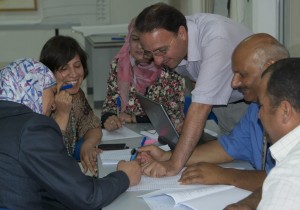Even better if
I have the pleasure and privilege of working with all sorts of people. I’m continually learning from them. On my piece of work for the UN, I am collaborating with a long-time friend, Karen Ardley. Karen has successfully run her own business, Karen Ardley Associates, for many years now and is one of the UK’s top educational leadership experts. Although we’re working together, I often sit in quiet awe as she leads her parts of the workshop we’re running.
Karen has a collection of “tools” that she developed over many years. They are highly effective techniques for organising and refining thoughts and ideas, skills and practice. One that particularly caught my eye in our recent workshop was something Karen uses to evaluate events. It is brilliantly simple.
Most events conclude with some form of audience evaluation. Typically, they score the proceedings and give participants the opportunity to flag strengths and weaknesses. Karen’s tool does just that but far more elegantly and constructively. As well as identifying the things that have gone well, she explores the things that haven’t. But, and this is the genius of it, rather than simply gathering a list of negative comments, Karen uses the prompt “Even better if…” It turns complaints into solutions. For example, rather than saying that the room was too hot, this approach records that next time we need better air conditioning; rather than complaining that the slide font was too small, this method suggests bigger text; rather than bemoaning the lack of time for questions, we propose short presentations or longer sessions.
The Even Better If approach means the session finishes with a positive and forward-looking activity. And that is precisely what is needed.
It’s a brilliant idea.

